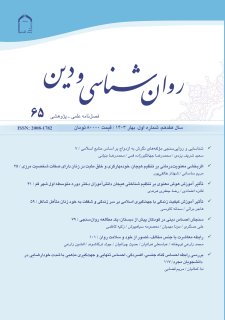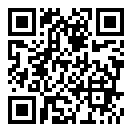اثربخشی معنویتدرمانی بر تنظیم هیجان، خودمهارگری و خلق مثبت در زنان دارای صفات شخصیت مرزی
 / دانشیار، گروه روانشناسی، واحد نایین، دانشگاه آزاد اسلامی، نایین، ایران / shkhaleghipour@yahoo.com
/ دانشیار، گروه روانشناسی، واحد نایین، دانشگاه آزاد اسلامی، نایین، ایران / shkhaleghipour@yahoo.comArticle data in English (انگلیسی)
- انجمن روان پزشکان آمریکا، 2013، راهنمای تشخیصی و آماری اختلالهای روانی DSM5، ترجمة فرزین رضایی، تهران، ارجمند.
- بخشیپور، عباس و محمود دژکام، 1384، «تحلیل عاملی تاییدی مقیاس عاطفه مثبت و منفی»، روانشناسی، ش 4، ص 351-364.
- پوراکبران، الهه و همکاران، 1398، «تأثیر معنویت درمانی گروهی بر افزایش تابآوری در زنان مبتلا به سرطان پستان»، دانشکده پزشکی مشهد، ش 1، ص 1393ـ1402.
- جانبزرگی، مسعود، 1398، درمان چندبعدی معنوی، یک رویکرد خداسو برای مشاوره و روان درمانگری، قم، پژوهشگاه حوزه و دانشگاه.
- جوکار، بهرام و فاطمه کمالی، 1399، «رابطه معنویت و ابعاد نظمجویی شناختی هیجان»، روانشناسی تحولی روانشناسان ایران، ش 12، ص 377-385.
- خالقیپور شهناز و همکاران، 1395، «اثربخشی معنویت درمانی اسلامی بر سبک زندگی و گلبولهای سفید خون محیطی سالمندان افسرده»، پژوهش در سلامت روانشناختی، ش 10، ص 16-29.
- عباسی، فاطمه و همکاران،1397، «موج چهارم رفتاردرمانی: روند شکلگیری درمانهای رفتاری و چالشهای آن»، رویش روانشناسی، ش 22، ص 223-236.
- عشوندی، خدایار و همکاران، 1396، «مراقبت معنوی بر اضطراب مرگ بیماران مبتلا به نارسایی مزمن کلیه مرحله انتهایی تحت همودیالیز: یک مطالعه کارآزمایی بالینی»، حیات، ش 23، ص 332-344.
- قاسمپور، عبدالله و همکاران، 1391، «خصوصیات روانسنجی پرسشنامه تنظیم هیجانی گراس و جان در یک نمونه ایرانی»، در: ششمین همایش بهداشت روانی دانشجویان، دانشگاه گیلان.
- کمری، سامان و همکاران، 1394، «اثربخشی آموزش معنویت درمانی مبتنی بر مثبت نگری بر میزان شادکامی و خوشبینی نوجوانان»، روانشناسی اجتماعی، ش3، ص 103-118.
- گنجی، حمزه، 1394، آسیبشناسی روانیDSM5، تهران، ساوالان.
- محمدزاده، علی و همکاران، 1384، «بررسی ساختار عاملی، روایی، پایایی و هنجاریابی مقیاس شخصیتی مرزی در دانشجویان دانشگاه شیراز»، اصول بهداشت روانی، ش 27، ص 75-89.
- محمودی، فیروز و همکاران، 1396، «بررسی نقش نگرش معنوی در پیشبینی راهبردهای تنظیم شناختی هیجانی در دانشجویان»، دین و سلامت، ش ۵ (۱)، ص ۵۱-۶۰
- موسوی مقدم، سیدرحمتالله، ۱۳۹۴، »بررسی رابطه هوش معنوی با خودکنترلی و مکانیسمهای دفاعی در دانش آموزان دختر سال سوم متوسطه»، مجله علوم پزشکی دانشگاه آزاد اسلامی، دوره ۲۵، ش 1، ص 43-59.
- Arango, I., Miranda, E., Ferrer, J. C. S., Fresán, A., Ortega, M. A. R., Vargas, A. No., ... & Robles, R., 2019, "Changes in facial emotional expression during a psychotherapeutic intervention for patients with a borderline personality disorder", Journal of psychiatric research, No. 114, p. 126-132.
- Ayala, E., & Carnero, A. M., 2013, "Determinants of burnout in acute and critical care military nursing personnel: a cross-sectional study from Peru", PloS one, No. 8 (1), e54408.
- Davis, M. A., 2019, "Understanding the relationship between mood and creativity: a meta-analysis", Organizational Behavior and Human Decision Processes, No. 108, p. 25-38.
- Doolittle, B. R., & Farrell, M., 2004, "The association between spirituality and depression in an urban clinic", Primary care companion to the Journal of clinical psychiatry, No. 6 (3), 114-118, doi:10.4088/pcc.v06n0302
- Gardner, K., & Qualter, P., 2009, "Emotional intelligence and borderline personality disorder", Personality and individual differences, No. 47 (2), p. 94-98.
- Greeson, J. M., Webber, D. M., Smoski, M. J., Brantley, J. G., Ekblad, A. G., Suarez, E. C., & Wolever, R. Q., 2011, "Changes in spirituality partly explain health-related quality of life outcomes after Mindfulness-Based Stress Reduction", Journal of behavioral medicine, No. 34 (6), p. 508-518.
- Gross JJ, John OP, 2003, "Individual differences in two emotion regulation processes: implications for affect, relationships, and well-being", Journal of personality and social psychology, No. 85(2), 348-362, doi:10.1037/0022-3514.85.2.348
- Hills, J., Paice, J. A., Cameron, J. R., & Shott, S, 2005, "Spirituality and distress in palliative care consultation", Journal of palliative medicine, No. 8(4), p. 782-788.
- Hosseini, S. M., Naseri-Salahshour, V., Farsi, Z., Esmaeili, M., Sajadi, M., Maddah, Z., & Fournier, A., 2022, "The effect of spirituality-oriented psychological counseling on the fear of death among patients undergoing chronic hemodialysis: A randomized controlled trial", European Journal of Integrative Medicine, No. 49, p.102103.
- Jafari, et al, 2013, "Spiritual therapy to improve the spiritual well-being of Iranian women with breast cancer: a randomized controlled trial", Evidence-Based Complementary and Alternative Medicine, No. (1), p. 1-9.
- Jackson M, Claridge G, 1991, "Reliability and validity of a psychotic trait questionnaire (STQ)", British Journal of Clinical Psychology, No. 30, p. 311-323.
- Johnson, B. No., Ashe, M. L., & Wilson, S. J, 2017, "Self-control capacity as a predictor of borderline personality disorder, features problematic drinking and their co-occurrence", Journal of Personality, 2017, No. 31(3), p. 289-305.
- Kernberg, O.F, Selzer, M.A, Koenigsberg, H.W, Carr,A.C, 1989, Psychodynamic Psychotherapy Of Borderline Patients, British, Basic Books press.
- Koenig, H. G.; McCullough, M.E. & Larson, D.B. (Eds), 2019, Handbook of religion and health, New York, Oxford University Press.
- Krause N, Pargament KI, Ironson G., 2018, "In the shadow of death: Religious hope as a moderator of the effects of age on death anxiety", The Journals of Gerontology: Series B, No. 73 (4), p. 696-703.
- Linehan M., 2016, Cognitive-behavioral treatment of borderline personality disorder, New York, The Guildford Press.
- Rawlings D, Claridge G, Freeman JL, 2001, "Principal components analysis of the Schizotypal Personality Scale(STA) and the Borderline Personality Scale(STB)", Personality and Individual Differences, No. 31, p. 409-419.
- Silberman, I., 2005, "Religion as a meaning-system: Implications for individual and societal wellbeing", Psychology of Religion Newsletter, No. 30(2), p. 1-9.
- Sorajjakool, S., Aja, V, et al, 2008, "Disconnection, depression, and spirituality: A study of the role of spirituality and meaning in the lives of individuals with severe depression", Pastoral Psychology, No. 56 (5), p. 521-532.
- Stern, A, 1938, "Psychoanalytic investigation of and therapy in the borderline group of neuroses”, Psychoanalytic Quarterly, No. 7, p. 467−489.
- Strong, C. M., Nowakowska, C., Santosa, C. M., Wang, P. W., Kramer, H. C., & Ketter, T. A., 2017, "Temperament-creativity relationships in mood disorder patients, healthy controls, and highly creative individuals", Journal of Affective Disorders, No. 100, p. 41-48.
- Subhi, T. Y., Neber, H, et al, 2012, "What We Know about Emotional Intelligence: How it Affects Learning, Work, Relationships, and Our Mental Health, Gifted and Talented International, No. 27(1), p. 161-166.
- Tangney, J., Baumeister, R., & Boone, A, 2004, "High Self-Control Predicts Good Adjustment, Less Pathology, Better Grades, and Interpersonal Success”, Journal Of Personality, No. 72(2), p. 271 -324.
- Tangney, J. P., Boone, A. L., & Baumeister, R. F, 2018, "High self-control predicts good adjustment, less pathology, better grades, and interpersonal success", Self-regulation and self-control, p. 173-212.
- Zweig-Frank H, Paris J., 2018, "Predictors of outcome in a 27-year follow-up of patients with a borderline personality disorder", Comprehensive Psychiatry, No. 43, p. 103–107.
- Vitorino, L. M., Possetti, J. G., Silva, M. T., de Souza Santos, G., Lucchetti, G., Moreira-Almeida, A., & Guimarães, M. V. C., 2021, "The role of spirituality and religiosity on suicidal ideation of homeless people in a large Brazilian urban center", Journal of affective disorders, No. 295, p. 930-936.
- Watson D, Clark LA, Tellegen A, 1988, "Development and validation of brief measures of positive and negative affect: the PANAS scales", Journal of personality and social psychology, No. 54(6), p. 1063-1070, DOI:10.1037//0022-3514.54.6.1063






